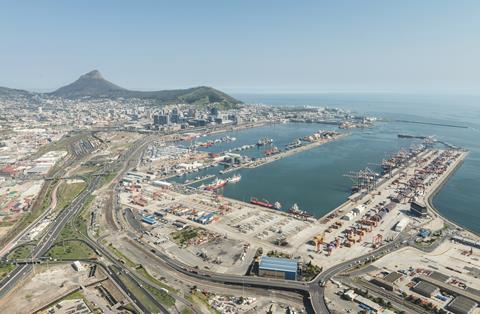Authorities says they are involved with various initiatives to address apple industry’s concerns about port of Cape Town

The Western Cape Government’s Department of Mobility has confirmed that it is actively pursuing measures to address constraints at the port of Cape Town.
The department’s deputy director-general, Corrine Gallant, outlined existing initiatives, that include the port’s of Logistics Development Project Management Unit, along with plans to revitalise the port’s rail infrastructure.
This week, the Western Cape Department of Mobility met with Two-a-Day, one of South Africa’s leading apple and pear packing and marketing cooperatives, and its logistics partner Link Supply Chain Management, for a strategic discussion and site visit aimed at tackling the logistical challenges affecting the fruit export industry.
“We are working on both the landside and waterside inefficiencies,” Gallant said. “This includes improving road freight safety and capacity, restoring rail services like the Overberg line, and ensuring that the Western Cape’s needs are heard at a national level. We cannot afford more costs in the chain – our focus is on solutions that remove bottlenecks and protect jobs.”
Industry representatives stressed that time is critical. Delays in decision-making, they warned, could see global shipping lines bypass Cape Town in favour of more efficient ports, delaying fruit shipments by one to two weeks and undermining the Western Cape’s competitiveness.
“The farmers, packhouses, and exporters are investing in efficiency every day,” Gerhard van Heerden, director at Link Supply Chain Management, said. “Now we need the same urgency and commitment at the port – because without it, the entire value chain is at risk.”
This view was echoed by Isaac Sileku, Western Cape Minister of Mobility, who emphasised the need for urgency and structured collaboration with Transnet. “We cannot afford to be reactive. We must have formal agreements and mechanisms in place so that when bottlenecks arise, we know exactly which button to press. Speed of execution is critical – our farmers and exporters cannot wait years for solutions,” Sileku said.
As a path forward the summit agreed that future actions should focus on faster execution of port and rail improvement projects, formal industry-government forums with direct access to decision-makers and targeted short-, medium-, and long-term actions to resolve both “low-hanging fruit” issues and systemic challenges.
The Western Cape apple and pear industry contributes significantly to local employment and the provincial economy. Stakeholders agreed that improving Cape Town’s port efficiency is essential not only for sustaining the sector but also for enhancing South Africa’s competitiveness in global fruit markets.



